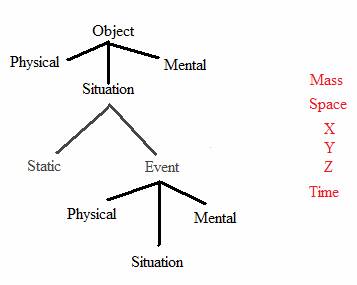Following this thread, I have put together a partial lattice (just from
the top down, but not as far as NoT) which may help visualize the structure
that has been discussed so far:

The items in red are properties, while the items in black are classes
in a subclass (isa) structure. It seems to me that “situation”
appears twice in the diagram, as I have drawn it above.
Doug, this can’t be what you mean. How would you model a
situation wherein “Object” is the most abstract (JFS’s “T”)?
Curiously,
-Rich
Sincerely,
Rich Cooper
EnglishLogicKernel.com
Rich AT EnglishLogicKernel DOT com
9 4 9 \ 5 2 5 - 5 7 1 2
-----Original Message-----
From: ontolog-forum-bounces@xxxxxxxxxxxxxxxx
[mailto:ontolog-forum-bounces@xxxxxxxxxxxxxxxx] On Behalf Of doug foxvog
Sent: Thursday, September 23, 2010 4:49 AM
To: [ontolog-forum]
Subject: Re: [ontolog-forum] do not trust quantifiers
On Tue, September 21, 2010 20:20, FERENC KOVACS said:
>
> Questions to Doug
>
DF> Physical objects have spatio-temporal properties as well as
mass.
DF> Mental constructs have temporal properties, but neither spatial
nor
DF> mass.
> Why should have all objects mass?
I was only referring to physical objects. Others won't have mass. I
suppose i should have said mass/energy since photons do not have mass,
yet could be included in the concept "physical object".
Narrower
subclasses of "physical object" would require mass.
> Situations have temporal properties and physical situations have
physical
> objects as physical participants.
>
> What is a situation?
A situation would be either an event or a static arrangement/state of
some object(s) over some time period. Examples of static situations
would be Barak Obama sitting on the desk in the Oval Office and a
specific bank account being overdrawn.
> Are all physical objects physical participants?
Of physical situations, yes. But a physical person is not a physical
participant in an ownership situation, nor is the object owned, even
if it is a physical object.
DF> [Non-physical situations have only non-physical participants,
such as
DF> the static
DF> situation of a sick leave account having 15 days in it or the
event of a
DF> law expiring.]
> Is a sick leave account and 15 days in it one object?
No.
The account is a single object. The amount in an account is a property
of an account that varies with time. The situation of a specific
account having a specific amount in it during a specific period is
an object, with one relation relating the situation to the account,
another relating it to the amount in the account, and another relating
it to the time period over which the situation holds.
The 15 days is a quantity -- which wouldn't fit the definition of
"object"
in many ontologies. I'm sure you could create some ontology, O1, in
which
O1:Object is a superclass of quantity.
> Is it a generic object?
The account is not the same as the quantity in the account, thus they
are
not the same object of any kind. If you define a set as an object,
then
the set comprising the account and a given quantity would by definition
be an object in an ontology with that definition.
> Is the event of law expiring complete or specific without a date?
It is not completely defined without a date.
DF> An illness is a physical event. A "form of
illness" is a subclass of
DF> Illness, which is a subclass of Physical Event.
> It may be so subject to the terminology (definitions) of your
ontology.
> It appears that illness is a physical event as well as a class
with
> sublasses (forms of illness).
These are two different things. Language is sloppy in referring to
both cancer and a case of a specific person having cancer as "a
disease".
"Illness" is a subclass of physical event. "An
illness", meaning "an
instance of the class Illness" is an individual instance of
physical
event. "Form of illness" (your term) is a subclass of
"type of illness"
and is a metaclass since its instances are themselves classes.
> What are the members of the class physical events?
An event which causes change in the physical world (involving particles
which physicists recognize) would be a physical event. Events such as
a person receiving or loosing rights at a certain clock time would not
be "physical" events.
> Boundaries? Extension? Intension?
> What is an event? By definition, in verbal terms that make sense
and may
> be visualized as it suggests to be "real"?, taking place
in spacetime.
Non-physical events would take place in time. It might not make much
sense to locate many of them to a narrower space than the sphere of
human
interaction, but a law coming into effect (or expiring) would be
located
in the territory of jurisdiction of the appropriate geo-political
entity.
Last time i checked, Cyc had a rather precise definition for Event and
Situation. I'm currently traveling and don't have those definitions
at my fingertips.
-- doug
> Thanks, Ferenc
DF> Both the organism that is sick and the illness are
spatio-temporal
DF> things, and thus have a
DF> location, starting time, and ending times (as well as other
properties
DF> of spatio-temporal things). The organism is also a
physical object, and
DF> thus has mass (as well as other properties of physical
objects). The
DF> illness is also an event and thus has a doer and an object acted
on (as
DF> well as other properties of events).
=============================================================
doug foxvog doug@xxxxxxxxxx http://ProgressiveAustin.org
"I speak as an American to the leaders of my own nation. The great
initiative in this war is ours. The initiative to stop it must be
ours."
- Dr. Martin Luther King Jr.
=============================================================
_________________________________________________________________
Message Archives: http://ontolog.cim3.net/forum/ontolog-forum/
Config Subscr: http://ontolog.cim3.net/mailman/listinfo/ontolog-forum/
Unsubscribe: mailto:ontolog-forum-leave@xxxxxxxxxxxxxxxx
Shared Files: http://ontolog.cim3.net/file/
Community Wiki: http://ontolog.cim3.net/wiki/
To join: http://ontolog.cim3.net/cgi-bin/wiki.pl?WikiHomePage#nid1J
To Post: mailto:ontolog-forum@xxxxxxxxxxxxxxxx
